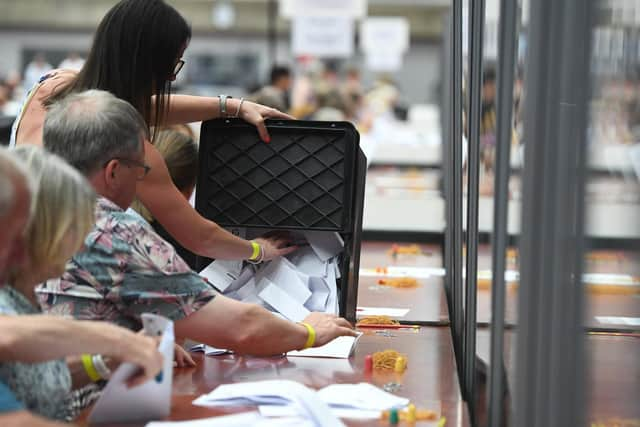Electoral reform is needed to avoid ‘wasted votes’ during elections - Yorkshire Post Letters
In 2019 Boris Johnson and the Conservatives won an 80 seat majority in the UK parliament. However, this was on the basis of winning just 43.5 per cent of the votes cast. Put another way, 56.5 per cent of votes cast were against the Conservatives, but many of those votes were wasted.
For Westminster elections Great Britain uses the First Past the Post (FPTP) system. FPTP has the effect of maximising the number of wasted votes. It also has the effect of privileging the Conservative Party. Additionally, we may note two further points: 1) The only other country in Europe using FPTP is Belarus (that might tell us something).
Advertisement
Hide AdAdvertisement
Hide Ad2) To minimise electoral malpractice in Northern Ireland and ensure ‘fair votes’, elections for the Northern Ireland Assembly make use of the Single Transferable Vote (STV) system of proportional representation. STV is also used for elections to the Scottish Assembly.


All this year opinion polls have indicated that Labour will win the up-coming general election. My strong contention is that any new Labour government ought to have as a high priority in its first term scrapping First Past the Post and replacing it with STV.
STV in multi-member constituencies using ‘open lists’ is widely recognised as the fairest electoral system.
It would be foolhardy for any Labour government to assert ‘Yes – we think the electoral system should be changed - but we have other priorities - cost of living - engendering economic growth etc. - so that electoral reform will have to await our second term’. By then it may be too late, and we get a Liz Truss or Suella Braverman-led government on 43.5 per cent of the vote.
Advertisement
Hide AdAdvertisement
Hide AdSo, I am arguing for the immediacy and urgency of well-overdue reform of our electoral system. There is a general equity or fairness point here. Reform would mean that in future wasted votes would be minimised.
As chair of Bradford for Europe I am clearly keen (in the long run) for the UK to rejoin the EU and in the medium term for the UK to move closer to the EU in its trading relationships. In technical terms, the UK should align to the Single Market and thus allow the whole of the UK to enjoy the benefits currently enjoyed only by Northern Ireland.
Understandably the 27 members of the EU will be wary of giving early and easy access to the Single Market or to EU full membership if there remains a danger that any renascent Conservative government, with an 80 seat majority on 43 per cent of the vote, comes to power in the UK and institutes Brexit Mk. II.
Increasingly public opinion in the UK is shifting towards an acknowledgement that Brexit was a mistake. There is an appetite for aligning to the Single Market whilst, perhaps for the moment stopping short of full membership of the EU (although the latest poll from Omnisis shows 46 per cent in favour of rejoining and only 36 per cent in favour of staying out).
Advertisement
Hide AdAdvertisement
Hide AdThe electorate in the UK needs to send a message to Brussels and to the EU member states that the majority opinion in the UK wants to align with the Single Market and in the longer term rejoin.
We need to put in place measures to prevent a rump of Tory extremists exploiting flaws in our electoral system to raise doubts about our consistency of purpose. Hence the urgency of reforming our electoral system.
Comment Guidelines
National World encourages reader discussion on our stories. User feedback, insights and back-and-forth exchanges add a rich layer of context to reporting. Please review our Community Guidelines before commenting.
